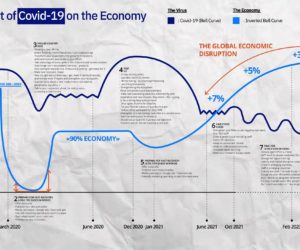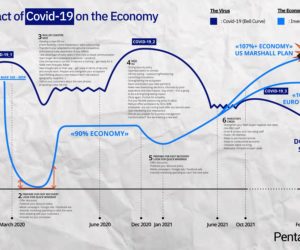When we analyze the history of major pandemics in the past, we discover that they have often lasted for a much longer time than the one which we are currently using to model our Coronavirus. For the duration of pandemics, let’s say: 4 years as a low average, and 10 years as a high, though some last much longer. AIDS, for example, will soon be celebrating its 40th birthday without ever having left the scene, even for a moment.
When a pandemic settles down after only two or three years, that usually goes along with a terrifying case fatality rate (think: Spanish Flu).
In this article, my aim is not to provide a summary of things you can already find on a handful of specialized websites, nor is it to alarm you more than you already are. In fact, I have not strayed from the script that I published earlier this year, which has worked perfectly up to now. In that script, I predicted a very long second winter wave before a trend of decreasing viral impact, followed by the likely arrival of a vaccine. I still believe that.

At the same time, I am a strategist, and I cannot leave entirely aside another, reasonably probable scenario. That is the object of this exercise.
What would happen if the pandemic lasted… 5 years? 10 years?
There is no doubt that we would then go off in a very different pattern from anything we have imagined today.
At 5 years, our population will be affected by long-lasting effects, which would have demographic consequences. What we now think of as slowdowns in certain sectors would then run the risk of becoming outright dissolutions. Seriously – who makes economic projections beyond 5 years or beyond 10 years? Realistically – no one. No one bets money over such uncertain horizons.
In some respects, a very long second wave could – as early as February or March 2021 – start to raise questions about the financing of real estate, for example.
Here, for this paper and in the reasoning that follows, the only principle that I’m holding on to is the effectiveness and agility of governmental actors in managing the crisis. To date, Asia has contained the problem perfectly. China is already rebounding and is now reaping benefits from the crisis. Soon the whole of Asia will emerge a winner from this event. A long scenario only reinforces something that is already clear today.
I decided to list 3 types of major facts that, if this epidemic lasts 5 years or more, will have long-lasting consequences on the organization of the entire world. In chronological order, these facts are: economic, demographic, and geopolitical.
1. Economic facts
- The disappearance of 60% of international tourist movement: freeing up large hotel complexes, in particular luxury hotels in town centers, and disappearance of cruises for at least 15 years…
- The collapse of the value of real estate in London, Paris, New York, and Amsterdam due to loss of tourism and mass telecommuting in services jobs.
- The disappearance of one of the two big aircraft manufacturers.
- A decrease in auto sales by -60% and the disappearance of 2 out of 3 car manufacturers. A very long period of telecommuting compels this.
- An IT boom that was never imagined, even at the peak of the first wave.
- A fall-off of the euro due to the collapse of trade balances in European countries, which are not technological enough.
- A considerable appreciation of the Japanese yen and the Chinese yuan, which becomes a reserve currency.
- Bankruptcy of Italy and France, where public and private debts would no longer be repayable in the context of a five- or ten-year health crisis.
- Disappearance of the euro currency, with an explosion of crypto-currencies.
- Fantastic opportunities for local logistics.
- Explosion in all outdoor activities, particularly in outdoor sports.
- Agriculture…
You don’t have to be a genius to see that Europe will be the most affected area: cars, planes, tourism. This affects the triad of Germany, France and Italy, the top 3 powers in the EU. In such a scenario, unemployment would soar everywhere in the West; permanently reaching 15 to 30% of the working population. Figures like that may seem extravagant – but are they really? When we know that on a given day, the main European economies reached 11% unemployment in a context of competitiveness and demand, both of which were considerably less degraded than they are today. Has anyone forgotten that, in a context of appalling competitiveness, Spain reached nearly 20% unemployment in the wake of 2008?
2. The political consequences
If the economic facts are already perceptible to some, the political facts are a little less so. However, the keenest observers will have noticed Chinese soft power, in the form of Beijing Newspeak which began around 2017 and has clearly become more popular in what some are calling ‘mask diplomacy’.
Potentially more serious is growing political disagreement, regardless of the subject. In just the most compelling example, we were able to vilify governments for the lack of masks, then protest against the obligation to wear them. But in an economic context of 15% or more unemployed, the temptation to destabilize would be enormous. We could expect populist conflagrations, which only ever lead to the most complete chaos. Many American observers believe very strongly in the hypothesis of civil war in the world’s largest economy, the pathfinder for the Western world.
What consequences would a civil war in the US have for the rest of the world?
And what about the effectiveness of enlightened authoritarian regimes or harsh democracies in Asia? China, Japan, Singapore, Korea and even Vietnam are giving the West lessons in healthcare efficiency, and our Western soft power is not about to recover. Ask yourself: where would you prefer to spend the winter of 2020 – Singapore or Rome? Hanoi or London? Admit it: you never thought that Hanoi could handle a health issue better than London.
The democratic idea, already undermined by the Asian dragons, could be completely lost in a number of countries: Hungary, Poland, Ukraine, Romania, but also potentially Italy and France … and the USA.
3. Geopolitical and demographic consequences
Let’s start with one huge, representative number to set the context. In the space of a single year, the economic differential between my home country of France and the People’s Republic of China has narrowed by 17.5%, compared to the usual annual rate of 2.25%. With all of its competitors, China is multiplying the speed of its economic catch-up by at least 5. Can you feel history speeding up? I’m pretty sure that no one in Beijing is losing sight of this.
For everything that touches on global strategy, we’re looking here at classifications of consequences that could span 15 to 25 years.
But how could such a context of fear and economic deterioration not lead to consequences in, for example, demographics? Who could guarantee us that this process hasn’t already started?
As for future health consequences, who knows what we’ll uncover? Were you aware for example that the British and Americans are conducting a study on the occurrence of new cases of post-Covid diabetes? Imagine for a moment multiplying the diabetic population of a country by a factor of 3. Or 4 …
Predators love this kind of opportunity.
On another note, we are witnessing the collapse of the East. (Nobody is praising Putin’s political genius anymore – at least we’re done with that.) The non-Asian East, all of it – from Eastern Europe to the Middle East – is doing badly. Lebanon, Syria, Iran, certainly, but also Russia, Belarus, Ukraine. The recent crisis between Azerbaijan and Armenia is only the most obvious illustration.
In countries ruled by aging monarchs – countries which have failed in their duty to manage economic transition and millennium change – leaders like Putin or Erdogan, seeing their country go down the drain, risk awakening very belligerent instincts, propelling themselves to national historic destiny. This is very compelling.
Against a backdrop of Russian-Turkish opposition, imagine for a moment conflicts mushrooming all over the East.
But faced with the collapse of their economies, why should European military powers such as France or the United Kingdom not once again seek their fortune elsewhere – particularly in the “rare earths” found mainly in Africa? When you know that technology is going to become the backbone of all exchanges, is that such a stupid proposition? Isn’t that one of the only ways to thwart China? I know, I’m delusional! But imagine a French populist regime, born from the collapse of the virtual European empire, challenged by a British populist regime, eager to reconnect with its own imperial past in Africa?
What I mean is this: a ‘normal’ pandemic causes colossal effects, and even if the effects that I am sketching here do not all appear, any historical analysis still confirms that pandemics have huge repercussions, completely external to the virus itself, deeply negative at first, but then sometimes very positive:
- The Black Death wipes out a third of the population of Europe, then drives numerous agrarian reforms, the emergence of the land economy, and finally the Renaissance.
- The Spanish Flu leads to the creation of many social security programs across Europe… but also possibly Nazism. A rejuvenated and reordered population favors radical ideas!
Heated debates between the supporters of policies for containing the virus, and the supporters of herd immunity – those new indignados, led by a billionaire, who is white, blond and president of the USA (I know that brings a smile to your lips – the indignados of 2011 have changed a lot.). These debates make no economic or political sense. The entire exercise is sterile.
The crisis brought about by Covid-19 will enter a new phase.
The general public will correctly start adopting a long and dark – even a very long and very dark – version of the crisis. People have been saying for a long time that it can’t last a year. But will it really last 4 years or more?
Regardless, a more traditional idea will creep into media, markets and minds, and with it a new aesthetic around this crisis, a semantics with codes close to collapse. A trend, to which decision-makers will have to respond. Once again, the important thing is not to be right, but to steer the boat well.
Those who go against the governance of the crisis will be the losers of history.
My inner entrepreneur, who controls my actions, makes its choices – but where should I look? Will my ideal customers of yesterday (ICP-Ideal Customer Profile) still be my ideal customers of tomorrow? If I am currently working actively with clients in tourism, and they experienced a slight upturn in the summer of 2020, what should I do in the years to come?
Getting to the response stage is a formidably difficult exercise that will result in extremely complex and diverse responses.
If you are interested in navigating this network of uncertainties and opportunities, I suggest you join our upcoming events on the subject by registering here.



 (8 votes, average: 3.75 out of 5)
(8 votes, average: 3.75 out of 5)





